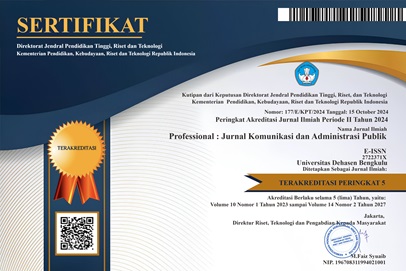Komunikasi Interpersonal Orang tua dengan Anak penyadang tunagrahita (Studi Kualitatif Deskriptif komunikasi empati antara orang tua dan anak penyandang Tunagrahita di Desa Pandai Kecamatan Woha Kab. Bima-NTB)
Abstract
This study discusses how interpersonal communication between parents and mentally retarded children in Pandai Village, Woha District, Bima-NTB with a research focus on the five aspects of the effectiveness of interpersonal communication namely openness, empathy, supportive attitude, positive attitude and equality. This research uses a descriptive qualitative approach with a case study method. Data collection techniques in the form of observation, interviews and documentation. Data analysis techniques namely data reduction, data presentation and drawing conclusions. The data validity test was carried out by means of source triangulation. The research results are; First, openness. Parents first express their feelings and thoughts towards their children so as to encourage children to express their emotions, feelings and desires. Parents are able to interpret the message conveyed by the child appropriately both in the form of verbal and nonverbal messages. Second, empathy is shown by parents by listening to children's stories carefully without interrupting. Show affection through body language such as touching or caressing. Third, support. Parents are able to provide support according to the needs of mentally retarded children such as choosing the right educational environment for the child's abilities. Fourth, a positive attitude. Parents involve children in doing good activities. Parents set an example or exemplary to children either through words or deeds. Give praise and rewards for the good behavior of children in an effort to meet their own needs.
Downloads
Copyright (c) 2022 Rahmi Rahmi, Junaidin Junaidin

This work is licensed under a Creative Commons Attribution-ShareAlike 4.0 International License.





